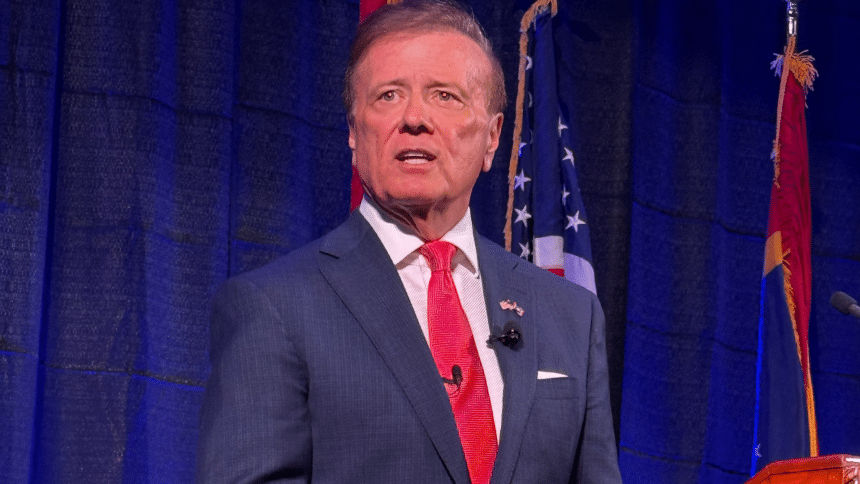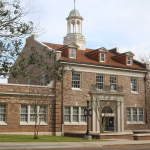He may have stopped just shy of announcing a bid for governor, but Mississippi billionaire Tommy Duff was not bashful about his vision for the future of the Magnolia State during a GOP gathering on Monday night.
It was a who’s who at the Sheraton Refuge in Flowood as the Rankin County Republican Executive Committee held its “Lincoln-Reagan-Trump” dinner in a ballroom packed with many of the state’s movers and shakers. Just about every aspect of society was represented. From elected officials to business tycoons to community leaders, a bulk of the powerful voices of Mississippi were all in one room.
Some of those influential figures even had time at the podium. The audience was greeted with an invocation from Agriculture Commissioner and 2027 gubernatorial hopeful Andy Gipson, along with prepared remarks from Mississippi GOP Chairman Mike Hurst and Secretary of State Michael Watson. But none of those speakers caught the attention of the crowd like Duff.
When Duff took the stage and stood next to the podium, all eyes were glued to him, and each ear soaked in every word he spoke. The businessman, known to intentionally do his best work behind the scenes, was out in the open giving what appeared to be his first, true political speech. In just under 30 minutes, the seasoned dealmaker delivered a speech articulating his vision for Mississippi’s future — and he did it without any notes or the assistance of a teleprompter.
Duff began his time on stage expressing his gratitude for the leadership of President Donald Trump, and how the commander-in-chief took it upon himself as a political outsider to guide the nation. The philanthropist was especially drawn to Trump’s willingness to challenge the status quo of American governance in pursuit of alternative paths forward.
“I think the thing that appeals to me the most about [Trump] and watching his policies is the fact that he’s an outsider. He looks at things from a different perspective,” Duff said. “I respect and support the fool out of the way he operates this country.”
Duff formed a bit of a subtle parallel when speaking on the president’s background because he, like Trump, comes from a business background. Duff and his brother, Jim, established themselves in the tire industry. The two took over their family’s struggling shop in the Pine Belt in 1983 and turned it into what we now know as Southern Tire Mart, the largest truck tire dealer and retread manufacturer in the U.S.
Around 24 years after taking over the family business, the two brothers started Duff Capital Investors and began buying up companies. Today, Duff Capital Investors manages more than 20 businesses across multiple sectors, and the Duff brothers are worth an estimated $3 billion, making them the richest individuals in the entire state of Mississippi.
Earlier this year, Tommy Duff ventured into a different sphere and launched a political action committee with his name attached to it. Duff PAC brands itself as an organization “supporting conservative candidates and advancing policies that promote opportunity, freedom, and prosperity across Mississippi.” Though no literature on the PAC’s website indicated that Duff was contemplating a run at office, the antennae of those invested in the state’s political scene were certainly raised.
While he had donated to candidates in the past, the new move appeared more deliberate. Duff PAC endorsed Republican Hugh Keating in a tight election for the Gulfport mayoral seat and played a pivotal role in that race. The committee’s signage was later spotted at the Neshoba County Fair, arguably the state’s largest annual political gathering. All of this raised questions about Duff’s intentions, and up until Monday night, answers were not made publicly available.
While addressing the crowd, Duff spoke on the significance of Rankin County in establishing the Republican Party’s ever-growing footprint in Mississippi. Highlighting the area’s role in Mississippi giving businessman-turned-politician Kirk Fordice the green light to be the first GOP governor since Reconstruction, Duff essentially coined Rankin County as the political epicenter of the state, leaving a feeling that he may be preparing to make a grand announcement.
But instead of elaborating on any personal aspirations, Duff proceeded to reflect on his time spurring change through his industry-building efforts and as a member of the board of trustees for the Mississippi Institutions of Higher Learning (IHL). One common theme, according to him, was that his atypical perspective was a catalyst that invoked positive momentum.
“Going back to when they asked me to serve on the college board, I had no educational experience, but I did have something that I thought was unique,” Duff said. “I had a different perspective on things. I had a different idea about the way things might be dealt with.”
From tackling bond issues to consolidating insurance policies to steering money toward more useful programs and away from seemingly unnecessary ones, Duff touted that his leadership in the IHL yielded hundreds of millions of dollars in savings for Mississippi’s colleges and universities while bolstering educational opportunities for students. He attributed these wins to his desire to think outside the box.
Nevertheless, with the positive comes a challenge, one that has plagued Mississippi for years. As enrollment rises at schools like the University of Mississippi and Mississippi State University, while tens of thousands simultaneously graduate from colleges across the state annually, talent retention remains a struggle. The all too familiar “brain drain,” where one is educated in Mississippi but pursues a career elsewhere, continues to be a burden on a state rife with opportunities yet short of laborers to reap any potential harvest.
Duff noted that one of his annual priorities is hiring around 50 graduates from Mississippi’s universities to be part of his family’s organization, offering them opportunities in various fields. However, one of the troubling elements of the interview process, according to Duff, is that he has yet to encounter a Mississippi graduate who wants to build a career in his or her home state.
“I’ve never, to this day, had someone tell me that they want to go to our store in Greenwood, or they want to go to Jackson, or they want to go to Hattiesburg or Columbia,” Duff explained. “They all have different dreams.”
Duff also touched on Mississippi having one of the lowest workforce participation rates in the nation, contending that the demand for high-paying jobs outweighs the supply. He asserted that strong and active communities are built on the backs of hard-working individuals who are proud of the paychecks they earn. In that, he praised recent efforts by lawmakers and leaders to enhance the state’s workforce.
A man held in high regard for his business prowess tipped his cap to Republican officials, both past and present, for their efforts to bring large companies to Mississippi while fostering a business-friendly environment through tax cuts. He further commended other successful Mississippi business owners for keeping their companies in-state instead of selling them off to a company in a larger market.
What Mississippi lacks in a homegrown Fortune 500 company, it has an abundance of private businesses generating living wages for its employees while continuing to expand operations in the state. Specifically spotlighting Ergon Oil in Flowood, Howard Industries in Laurel, the Taylor Group in Louisville, Yates Construction in Philadelphia, and C Spire in Ridgeland, Duff emphasized that these businesses remain headquartered in Mississippi based on their owners’ dedication to the state.
As for Fortune 500 companies, an abundance have established operations in the state. Huntington Ingalls has made its presence known on the Gulf Coast, Toyota has become an integral member of the Blue Springs community, Nissan has been a major player in Canton, and Amazon Web Services delivered the largest economic development win in state history. But one question remains for Duff: Is it enough for Mississippi to have continued success?
“It’s almost like we’re driving down the road and Mississippi’s going 50 miles per hour. I will tell you, several years ago, we weren’t doing 50. We were doing about 40 miles per hour, but our southeastern state friends were doing 50 miles per hour, and we were getting a little further behind each year,” Duff said.
“I am pleased to report that we have stepped on the gas pedal, and we’re up to doing what they’re doing. I think the difference is that they’re probably seven to 10 miles ahead of us, so what are we going to do for the future?”
The wins in Mississippi have captivated Duff’s attention, but they have not distracted him from what he believes to be problem areas. Pointing to troubling economic and population trends in the Delta and southwest Mississippi, Duff inferred there are pockets of the state not experiencing the spoils of the successes seen elsewhere, and that leaders should focus on building those communities.
Duff, speaking on his record, made it abundantly clear that when he sees a need, he wastes no time finding a solution. When he saw a need for additional tire production and an opportunity for that to occur in Mississippi, he worked to convince Yokohama to set up shop in Clay County and Continental to open a plant in Hinds County, underscoring victories for his company and local economies.
Challenging current lawmakers, Duff said Mississippi needs to do more to grow its small businesses through workforce development and deregulation. Reminiscing about a time when he and his brother contemplated the prospect of leaving the Magnolia State over concerns about an unstable legal environment leading to excessive amounts of dollars flowing into litigation, Duff praised former Gov. Haley Barbour’s signing of the 2004 Tort Reform Act, one that ultimately kept the Duffs at home.
That bold leadership, per Duff’s recounting, prevented the state’s lone billionaires from bolting, and it will take continuous boldness from the powers that be to move Mississippi to a place where the state isn’t just competing with its neighbors but taking the reins and lapping them. To Duff, a distinct perspective is required to build upon momentum garnered and push Mississippi forward to a future brighter than ever imagined.
“We’re doing all the right conservative things to be successful. It’s time for us to think it,” Duff said. “As I discussed my vision, I want you to understand that I’m doing it, very frankly, because this is what we want. We want our state to progress. It means everything to us.”
Duff concluded his speech without announcing a future political move, but everyone in the room took notice that he was certainly eager to have a voice in the decisions relating to Mississippi’s future. The Republican, if he happens to announce a bid for governor, would join a field expected to be crowded.
Currently, Gipson’s cowboy hat is the lone occupant of the GOP ring, but other players like Lt. Gov. Delbert Hosemann, Attorney General Lynn Fitch, State Auditor Shad White, and former House Speaker Philip Gunn could shoot their shot to fill the vacancy soon to be left by a term-limited Gov. Tate Reeves. However, after Monday’s speech, Duff would undoubtedly find himself among the frontrunners of the party as the jockeying heats up.








